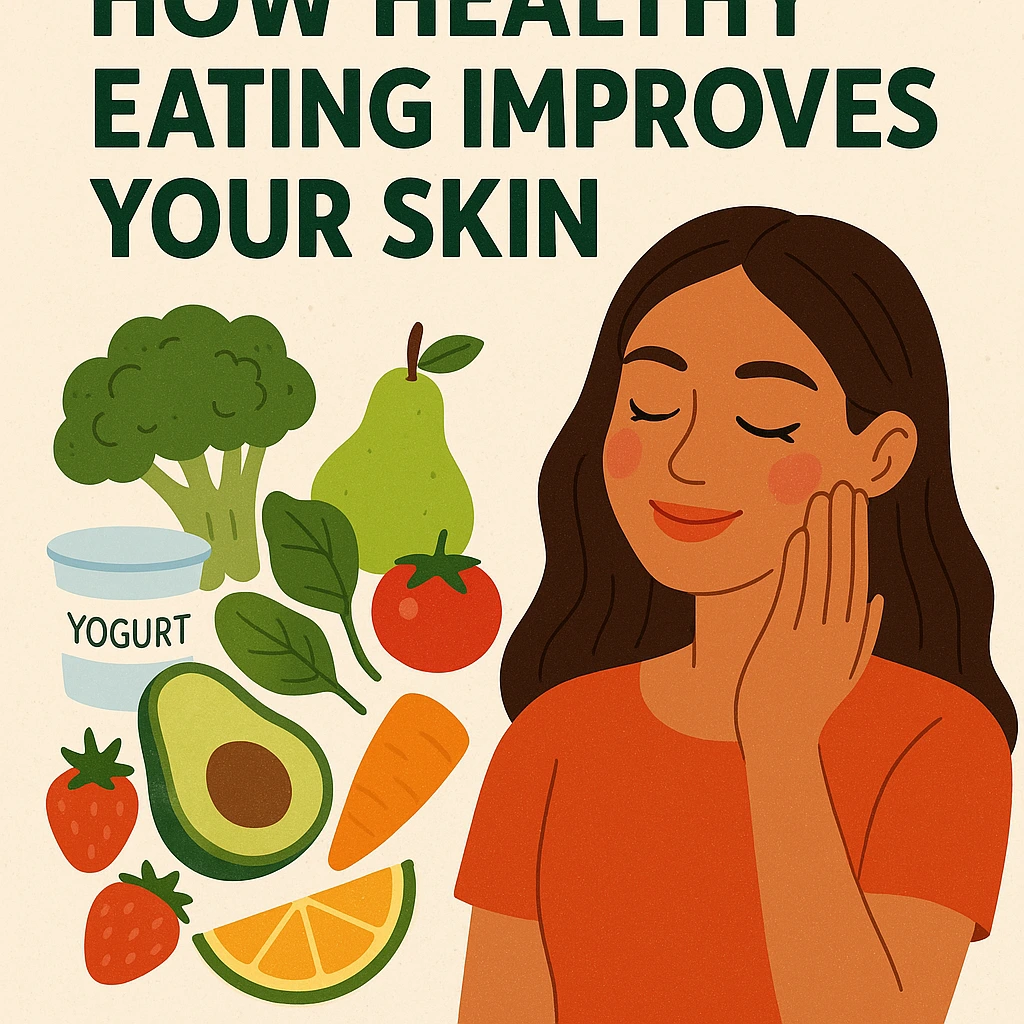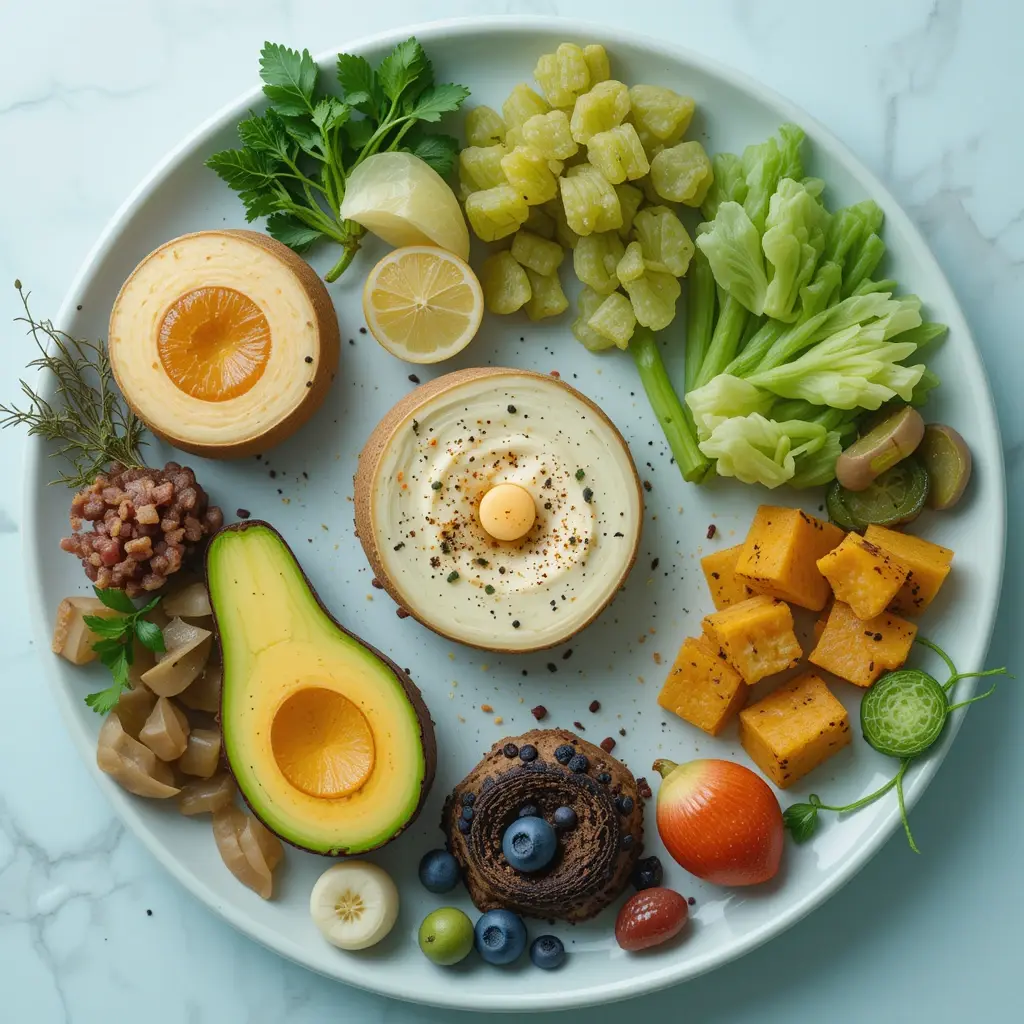Introduction
When it comes to achieving radiant, glowing skin, many people focus solely on skincare products like cleansers, serums, and moisturizers. While these are undoubtedly important, there’s another critical factor that often gets overlooked: how healthy eating improves your skin . If you’ve ever wondered, “Does eating healthy make your skin clear?” or “How does nutrition affect skin health?”, you’re not alone. The connection between diet and skin health is undeniable, and understanding this relationship can transform your complexion.
In this article, we’ll dive deep into the science behind how a nutrient-rich diet impacts your skin, explore how long it takes to see results, and provide actionable tips to help you achieve healthier skin through better nutrition. Whether you’re battling acne, dryness, or dullness, the answer may lie in what’s on your plate.
Table of Contents

Section 1: Understanding How Healthy Eating Improves Your Skin
How Healthy Eating Improves Your Skin: The Science Behind It
The saying “you are what you eat” couldn’t be truer when it comes to your skin. So, how does nutrition affect skin health , and why does it matter so much? Your skin is the body’s largest organ, and it requires a steady supply of vitamins, minerals, and antioxidants to function optimally. These nutrients repair damaged cells, combat inflammation, and protect against environmental stressors like UV rays and pollution.
For example, foods rich in omega-3 fatty acids—like salmon, walnuts, and flaxseeds—help reduce redness and irritation, making them ideal for sensitive or acne-prone skin. Similarly, vitamin C–rich fruits like oranges, strawberries, and kiwis support collagen production, keeping your skin firm and youthful. If you’re asking yourself, “Why does my skin look better after I eat nutrient-dense meals?” it’s because these foods provide the essential building blocks for skin repair and regeneration.
But the benefits don’t stop there. A balanced diet also supports a healthy gut microbiome, which plays a crucial role in skin health. Studies show that an imbalance in gut bacteria can lead to conditions like eczema, psoriasis, and acne. By incorporating probiotic-rich foods like yogurt, kefir, and sauerkraut into your diet, you can promote a healthier gut-skin connection.
Section 2: Timeframe for Results – How Long Does It Take to See Changes?
How Long Does It Take for Your Skin to Clear Up After Eating Healthy?
One of the most common questions people ask is, “How long until you see results from eating healthy?” or “How long does it take for a healthy diet to start working?” While the exact timeline varies depending on individual factors like genetics, age, and existing skin conditions, most people begin to notice improvements within 4–6 weeks.
Here’s why: your skin has a natural renewal cycle that takes about 28 days. During this time, old skin cells shed, and new ones rise to the surface. When you adopt a healthy diet, your body starts to detoxify and rebuild healthier skin cells. For instance, if you’re following a diet rich in whole grains, lean proteins, and leafy greens, you may start seeing reduced breakouts, improved hydration, and a more even skin tone within this timeframe.
However, consistency is key. If you’re wondering, “Will my skin clear up if I eat healthy?” , the answer depends on how committed you are to maintaining these habits. Stick with it for at least two months to experience significant improvements. Pairing your diet with proper hydration, sleep, and gentle skincare routines will further enhance your results.

Section 3: Acne and Skin Clarity – Can Diet Help with Acne?
Does Eating Better Help Acne? Exploring the Connection
Acne sufferers often ask, “Does eating better help acne?” or “Can eating better clear your skin?” The short answer is yes—diet plays a significant role in managing acne. Certain foods can either exacerbate or alleviate breakouts, depending on their impact on hormones, inflammation, and oil production.
For example, high-glycemic foods like white bread, sugary snacks, and processed cereals cause insulin spikes, which trigger the production of sebum (oil) in the skin. This excess oil can clog pores and lead to acne. On the other hand, low-glycemic foods like sweet potatoes, quinoa, and lentils help regulate blood sugar levels, reducing the risk of breakouts.
Additionally, anti-inflammatory foods like turmeric, spinach, and almonds can calm irritated skin and reduce redness. If you’re trying to figure out “Which diet is better for skin?” , consider focusing on Mediterranean or plant-based diets. Both emphasize fresh, unprocessed ingredients and have been shown to improve skin clarity and texture.
Section 4: Hydration and Beverages – What Should You Drink for Clear Skin?
What to Drink for Clear Skin: The Role of Hydration
Hydration is a cornerstone of skin health, but beyond water, what to drink for clear skin includes beverages packed with antioxidants and electrolytes. Green tea, for instance, is rich in polyphenols, which fight inflammation and protect against UV damage. Coconut water replenishes lost electrolytes, keeping your skin hydrated from within, while herbal infusions like chamomile and rooibos soothe irritation and promote detoxification.
If you’re wondering, “Can hydration improve my complexion?” , the answer is a resounding yes. Dehydration can lead to dryness, flakiness, and even premature aging. Drinking at least eight glasses of water daily, alongside hydrating beverages, ensures your skin stays plump, supple, and glowing. For an extra boost, add slices of lemon or cucumber to your water for a dose of vitamin C and antioxidants.

Section 5: Nutrition Deficiency and Skin Problems – Can Lack of Nutrition Cause Skin Issues?
Can Lack of Nutrition Cause Skin Problems? Understanding the Risks
Poor nutrition doesn’t just affect internal health—it shows on your skin as well. Many people ask, “Can lack of nutrition cause skin problems?” or “Does poor nutrition harm your skin?” The answer is yes. Deficiencies in key nutrients like vitamin A, zinc, and omega-3 fatty acids can lead to a host of issues, including dryness, dullness, and even chronic conditions like eczema or psoriasis.
For instance, low levels of vitamin E impair your skin’s ability to heal, leaving it vulnerable to damage. Insufficient zinc can worsen acne by slowing down the healing process, while a lack of omega-3s increases inflammation and redness. To prevent these problems, ensure your diet includes nutrient-rich foods like carrots (rich in vitamin A), nuts (packed with vitamin E), and flaxseeds (a great source of omega-3s).
If you suspect a deficiency, consider consulting a healthcare provider for personalized advice. In some cases, supplements may be necessary to restore balance and improve your skin’s health.
Conclusion
In conclusion, how healthy eating improves your skin is undeniable. From reducing acne to enhancing hydration and combating inflammation, the benefits of a nutrient-rich diet are vast and well-documented. Whether you’re asking, “Does eating healthy make your skin clear?” or “How long does it take for your skin to clear up after eating healthy?” , the answer lies in consistency and balance.
Start small by incorporating more fruits, vegetables, and hydrating beverages into your daily routine, and watch your skin transform over time. Remember, achieving radiant skin isn’t just about what you put on your face—it’s about what you put in your body. So, prioritize nutrition, stay hydrated, and enjoy the glow that comes with a healthier lifestyle.
FAQs
1. How does nutrition affect skin health?
“How does nutrition affect skin health?” is a common question because the connection between what you eat and how your skin looks is profound. Nutrition provides essential vitamins like vitamin C, which boosts collagen production, and omega-3 fatty acids, which reduce redness and inflammation. If you’re wondering, “Can food improve skin?” the answer is yes—nutrient-rich foods like avocados, berries, and nuts can repair skin cells and give you a natural glow.
2. Does eating healthy make your skin clear?
If you’re asking, “Does eating healthy make your skin clear?” or “Will my skin clear up if I eat healthy?” the answer is that a balanced diet can significantly reduce breakouts and improve texture. Foods rich in antioxidants, like spinach and blueberries, fight free radicals that cause acne. Cutting back on processed foods and sugar also minimizes oil production, helping your skin stay clear and radiant.
3. How long does it take for your skin to clear up after eating healthy?
Many people wonder, “How long does it take for your skin to clear up after eating healthy?” or “How long until you see results from eating healthy?” Typically, you’ll notice improvements within 4–6 weeks as your skin completes its renewal cycle. However, consistency is key—long-term dietary changes yield the best results, especially if you’re dealing with stubborn conditions like acne or dullness.
4. Which diet is better for skin?
When considering, “Which diet is better for skin?” or “What kind of diet improves skin health?” the Mediterranean and plant-based diets stand out. These diets emphasize whole, unprocessed foods like fruits, vegetables, and healthy fats, which reduce inflammation and promote hydration. If you’re looking for clearer, healthier skin, incorporating these nutrient-dense foods into your meals is a great place to start.
5. Does eating better help acne?
“Does eating better help acne?” and “Can eating better clear your skin?” are questions many acne sufferers ask. The answer is yes—foods like salmon, sweet potatoes, and almonds can regulate hormones and reduce inflammation, both of which contribute to clearer skin. On the other hand, avoiding high-glycemic foods like white bread and sugary snacks can prevent acne flare-ups caused by insulin spikes.
6. What to drink for clear skin?
If you’re wondering, “What to drink for clear skin?” or “Can hydration improve my complexion?” green tea is an excellent choice due to its anti-inflammatory properties. Coconut water hydrates your skin from within, while herbal teas like chamomile soothe irritation. Drinking plenty of water alongside these beverages ensures your skin stays plump, hydrated, and glowing.
7. Why is my skin breaking out when I eat healthier?
“Why is my skin breaking out when I eat healthier?” or “Could a healthy diet cause temporary breakouts?” are valid concerns. This could be due to a “purging” phase where your body adjusts to dietary changes, flushing out toxins through the skin. Alternatively, new foods like dairy or gluten may not agree with you. If breakouts persist, consider consulting a dermatologist to identify triggers.
8. Can lack of nutrition cause skin problems?
“Can lack of nutrition cause skin problems?” and “Does poor nutrition harm your skin?” are important questions to address. Deficiencies in key nutrients like vitamin A, zinc, or omega-3 fatty acids can lead to dryness, flakiness, or even conditions like eczema. For example, insufficient zinc impairs wound healing, while low vitamin E levels leave your skin vulnerable to damage. A balanced diet or supplements can reverse these issues.
9. How do you know if your diet is affecting your skin?
“How do you know if your diet is affecting your skin?” or “Can my food choices impact my complexion?” can be answered by observing patterns. If you notice increased breakouts, redness, or dryness after eating certain foods, they may be triggering your skin. Conversely, glowing skin after eating nutrient-rich meals is a positive sign. Keeping a food diary can help you track these connections and adjust accordingly.
10. Will my skin clear up if I eat healthy?
“Will my skin clear up if I eat healthy?” and “Does eating well lead to better skin?” are questions with promising answers. While healthy eating significantly improves skin clarity for most people, results depend on consistency and other factors like skincare habits and stress levels. Pairing a nutrient-rich diet with proper hydration, sleep, and gentle skincare products will maximize your chances of achieving clear, radiant skin over time.
you may also like:
What should I do immediately after running? A Complete Guide to Post-Run Recovery
What Happens When You Start Eating Healthier? A Complete Guide to Transforming Your Body and Mind
Mediterranean Salad Recipes: A Fresh Path to Health, Flavor, and Joy
Salad Recipes for Weight Loss: The Ultimate Guide to Healthy Eating and Wellness
Unlock the Benefits of Salad: Nutritional Power for Health, Wellness, and Active Living
More relevant articles here >>>
More Health and Wellness salad recipes >>>
More Energy and Active Lifestyle salad recipes >>>
More Cultural and Seasonal Recipes >>>
References:
“Diet and Acne: A Review of the Evidence”, International Journal of Dermatology
“Omega-3 Fatty Acids and Their Role in Inflammatory Skin Diseases” by Clinical Nutrition Journal
“The Gut-Skin Axis: Current Knowledge of the Interplay Between Diet, Microbiome, and Skin Health” by Frontiers in Microbiology Journal




